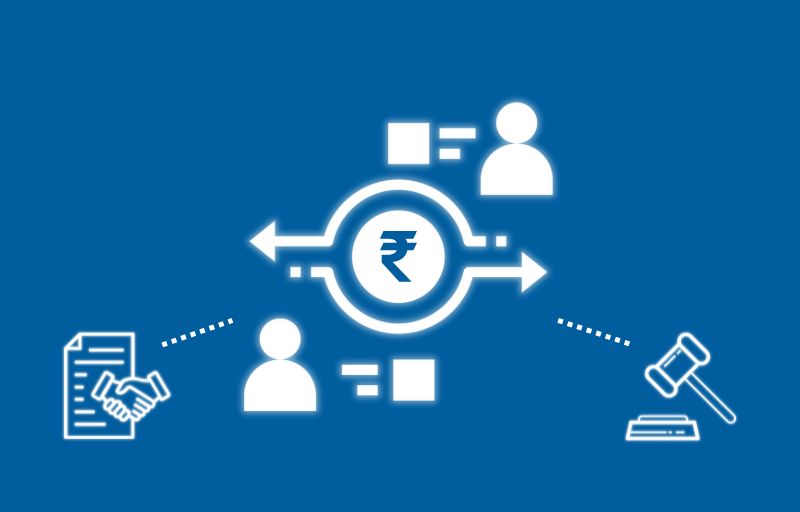Corporate Law Newsletter – SEBI Amended Regulations on Minimum Information for Review and Approval of Related Party Transactions : March 2025
1. Introduction:
The Securities and Exchange Board of India (“SEBI“) has issued a circular (SEBI/HO/CFD/CFD-PoD-2/P/CIR/2025/18) dated February 14, 2025 (“SEBI Circular“), introducing new requirements for listed entities concerning related party transactions (“RPTs“).
To ensure a standardized approach and assist listed entities in compliance, SEBI has amended the SEBI (Listing Obligations and Disclosure Requirements) Regulations, 2015 (“LODR Regulations“), mandating adherence to industry standards formulated by the Industry Standards Forum (“ISF“), comprising of representatives from three industry associations, viz. ASSOCHAM, CII and FICCI. Developed under the aegis of the Stock Exchanges and in consultation with SEBI, these industry standards define the minimum information that must be provided to the audit committee and shareholders for review and approval of RPTs (“Industry Standards”).
Further, the applicability of the Industry Standards in different scenarios has been clarified by the National Stock Exchange of India Limited (“NSE“) through its circular no. NSE/CML/2025/12 dated March 15, 2025, by way of FAQs.
2. Regulatory Framework of RPT Transactions:
2.1 – Audit Committee and Shareholder Approval:
Regulation 23(2) and (3) of the LODR Regulations require RPTs and subsequent material modification thereto, to be approved by the audit committee. Regulation 23(4) further requires material RPTs and subsequent material modification thereto, to be approved by the shareholders.
As per Regulation 23(1) & (1A) of the LODR Regulations, a transaction with a related party shall be considered Material RPT (“MRPT”), if the transaction(s) to be entered into individually or taken together with previous transactions during a financial year, exceeds INR 1000 crore or 10% of the annual consolidated turnover of the listed entity as per the last audited financial statements of the listed entity, whichever is lower.
2.2 – Information Disclosure Requirements:
Part A and Part B of Section III-B of the Master Circular for compliance with the provisions of the Securities and Exchange Board of India (Listing Obligations and Disclosure Requirements) Regulations, 2015 by listed entities dated November 11, 2024 (“Master Circular”) specify the information to be placed by the listed companies before the audit committee and shareholders, respectively, for consideration of RPTs.
3. Key Highlights of the Amendments:
3.1 – Under the SEBI Circular, SEBI has amended Part A and Part B of Section III-B of the Master Circular to mandate listed entities to comply with the Industry Standards prescribed by the ISF for minimum information disclosure to the Audit Committee and shareholders when reviewing and approving related party transactions (RPTs).
3.2 – Consequently, all disclosures made by listed companies to the audit committee and shareholders for RPT approvals must adhere to the minimum disclosure norms prescribed under the Industry Standards.
4. Applicability of the amendments:
4.1 – The amendments will come into effect from April 1, 2025 and will apply to RPTs entered into by listed entities on or after this date, where approval/ ratification from the Audit Committee or shareholders is sought on or after this date.
4.2 – It has been clarified by the National Stock Exchange of India via Circular NSE/CML/2025/12 dated March 15, 2025 that:
a) If approval has been granted by the audit committee and /or shareholders before April 1, 2025 for RPTs to be entered into on or after April 1, 2025, then the listed entity need not seek these approvals again with disclosures as per the Industry Standards. However, for approval of any material modification to such RPTs on or after April 1, 2025, the Industry Standards shall be applicable.
b) If omnibus approval has been granted before April 1, 2025 for RPTs for FY 2025-26, then the listed entity need not seek fresh approval with disclosures as per the Industry However, for approval of any material modification to such RPTs on or after April 1, 2025, the Industry Standards shall be applicable.
c) Further, if the Material RPT is approved by Audit Committee before April 1, 2025 and notice to the Shareholders is either sent before April 1, 2025 or is sent on or after April 1, 2025, the Industry Standards shall not be applicable.
5. Key Highlights of the Industry Standard:
5.1 – The objective of these Industry Standards is to standardize the minimum information to be provided to the Audit Committee and the shareholders, wherever required, for review and approval of a RPT.
a) Minimum disclosure to audit committee: The standards and format for minimum information to be provided for review of the Audit Committee for approval (including ratification) of RPTs, has be specified under Para 3 and Para 4 of the Industry Standards.
b) Minimum disclosure to shareholders: The standards for minimum information to be provided to the shareholders for consideration of RPTs have been specified under Para 5 of the Industry Standards.
5.2 – The Industry Standards classify RPTs as below:
a) MRPTs – Material RPT as defined under Regulation 23(1) & (1A) of the LODR Regulations.
b) ORPTs – Other non-material RPTs exceeding materiality thresholds under Reg 30(4) of LODR. This includes transaction(s) with a related party, where the transaction(s) to be entered into individually or taken together with previous transactions during a financial year, exceed lower of the following:
- 2% of turnover, as per the last audited consolidated financial statements of the listed entity;
- 2% of net worth, as per the last audited consolidated financial statements of the listed entity, except in case the arithmetic value of the net worth is negative;
- 5% of the average of absolute value of profit or loss after tax, as per the last three audited consolidated financial statements of the listed entity;
c) RRPTs – Residual RPTs not falling under
5.3 – The Industry Standards shall be applicable to the RPT as per the applicability matrix provided in Annexure A to this
6. Standards for Minimum Information to be provided to the Audit Committee for review and approval (including ratification) of RPTs:
6.1 – Para 3 and Para 4 of the Industry Standards set out the minimum information required to be furnished to the Audit Committee for the review and approval (including ratification) of RPTs. These standards are designed to ensure transparency, consistency, and informed decision-making by the Audit
6.2 – Scope of Information Required:
The management of the listed entity shall provide the Audit Committee with the details specified in the prescribed format under Para 4 of the Industry Standards, as set out in Annexure B. The information should include financial and non-financial aspects necessary for assessing the fairness and impact of the transaction.
6.3 – Key Disclosures:
- Name and nature of the related party.
- Relationship with the listed entity.
- Nature, tenure, and value of the transaction
- Rationale and benefits of the transaction.
- Comparison with similar transactions with unrelated parties.
- Details of any prior transactions with the same related party.
- Certificate from CEO/CFO or other Key Managerial Personnel of the Listed Entity and from every director of the listed entity who is also promoter (“promoter director”) affirming that the transaction is not prejudicial to the interest of public shareholders and the terms and conditions are not unfavourable to the listed company, if compared to a similar transaction with an unrelated party.
- Valuation report or other report of external party, if any.
- Audited financial statements of the related party as required to be submitted to the Audit Committee. If these statements are not available for any financial year, the financial details shall be certified by the related party. Additionally, if the related party follows a different financial year, this fact shall be disclosed.
6.4 – Additional Considerations:
Information must be provided against each information provided in the format. Indicate ‘NA’ if a field is not applicable and indicate ‘NIL’, where no comments have been provided.
Where the transaction involves loans, guarantees, or investments, additional disclosures such as credit ratings, repayment schedules, and purpose of funds must be provided.
If the RPT involves royalty payments or brand usage fees, peer comparison and bifurcation of the cost into management fees, service fees, etc., if any, must be included.
The criteria for selecting industry peers shall be as follows:
- The listed entity will strive to compare the royalty payment with a minimum of 3 industry peers, where feasible.
- The selection shall follow the following hierarchy:i) Preference will be given to Indian listed industryii) If Indian listed industry peers are not available, a comparison may be made with listed global industry peers, if available.
- If no suitable Indian listed/ global industry peers are available, the listed entity may refer to the peer group considered by SEBI-registered research analysts in their publicly available research reports (“Research Analyst Peer Set”). If the listed entity’s business model differs from such Research Analyst Peer Set, it may provide an explanation to clarify the distinction.
- In cases where fewer than three industry peers are available, the listed entity will disclose that only one or two peers are available for comparison.
6.5 Review and Approval Process:
The Audit Committee shall assess whether the RPT is in the best interests of the listed entity and its shareholders.
If the Audit Committee has any comments on the line items as per the format specified in Para 4 of these Standards, it shall provide them accordingly. However, comments are required only for applicable line items, while non-applicable line items may be left blank.
The information provided in the standardized format shall be incorporated into the agenda of the Audit Committee meeting. The comments of the Audit Committee, where applicable, shall be recorded in the minutes of the meeting.
7. Standards for Minimum Information to be provided to the shareholders for consideration of RPTs:
7.1 – In accordance with Regulation 23(4) of the SEBI (Listing Obligations and Disclosure Requirements) Regulations, 2015 (“LODR Regulations”), shareholder approval is required for material Related Party Transactions (RPTs). Additionally, as per the amended Master Circular, listed entities must ensure that shareholders receive adequate and standardized information as provided under the Industry Standards to make informed decisions regarding RPT approvals.
7.2 – Para 5 of the Industry Standards defines the minimum information to be included in the explanatory statement accompanying notice for the approval (or ratification) of RPTs, to enable the shareholders to take a view whether the terms and conditions of the RPT are favorable to the listed entity. It specifies that the explanatory statement to the notice sent to shareholders for RPT approval shall include the following key details:
a) Transaction and Related Party Details:
The listed company shall provide the shareholders with the name of the related party, the nature of relationship between the listed entity and the related party, the nature, duration, and value of the transaction and other material terms and conditions of the proposed transaction, including pricing methodology.
b) Information placed before Audit Committee:
Information as placed before the Audit Committee, to the extent applicable. In case of redacted disclosure, the Audit committee to certify that the disclosure provides all the necessary information to make an informed decision.
Further, the Audit committee to provide a statement of assessment that relevant disclosures for decision-making were placed before them, and they have determined that the promoter(s) will not benefit from the RPT at the expense of public shareholders.
c) Justification for the RPT:
Justification as to why the proposed transaction is in the interest of the listed entity.
d) Review and comments by the Audit committee:
Disclose the fact that the Audit Committee had reviewed the certificate provided by the CEO or CFO or any other KMP as well as the certificate provided by the promoter directors of the Listed Entity affirming that the transaction is not prejudicial to the interest of public shareholders and the terms and conditions are not unfavourable to the sited company, if compared to a similar transaction with an unrelated party.
Further the comments, if any, provided by the Board/ Audit Committee of the listed entity shall also be disclosed.
e) Additional information to be disclosed in case of bids from unrelated parties: In case of sale, purchase, or supply of goods or services, or the sale, lease, or disposal of assets of a subsidiary, unit, division, or undertaking of the listed entity, if the Audit Committee has reviewed the terms and conditions of bids from unrelated parties then such fact shall be stated. In case bids have not been invited, the fact shall be disclosed along with the justification thereof, and in case comparable bids are not available, state the basis for recommending that the terms of the RPT are beneficial to the shareholders.
f) External party reports: Copy of the valuation report or other reports of external party, if any, considered by Audit Committee while approving the RPT.
g) Any other information that may be relevant.
8. Conclusion
The Industry Standards provide a structured approach to ensuring that audit committees and the shareholders receive comprehensive, accurate, and decision-useful information when reviewing and approving RPTs. By implementing these standards, listed entities can enhance governance, promote fair treatment of public shareholders, and ensure compliance with SEBI and Companies Act requirements.
Link to Annexure A: https://legalogic.com/wp-content/uploads/2025/03/Annexure-A.pdf
Link to Annexure B: https://legalogic.com/wp-content/uploads/2025/03/Annexure-B.pdf
About Us:
LegaLogic (www.legalogic.com) is a full-service law firm with more than 50 people team. Founded in 2013, LegaLogic has been advising across industry segments. It is a go-to firm for the Corporate Commercial Matters, M&A, Intellectual Property, Employment Law, Real Estate, Dispute Resolution, Litigation, Insurance Advisory, India Entry Strategy and Private Client Practice. To know more about our Corporate Commercial and Insurance Advisory Practice, please write to us at m&a@legalogic.com.
Disclaimer:
This newsletter is for informational purpose only and should not be treated as legal advice or opinion. No part of this newsletter should be considered an advertisement or solicitation of professional services of LegaLogic.





